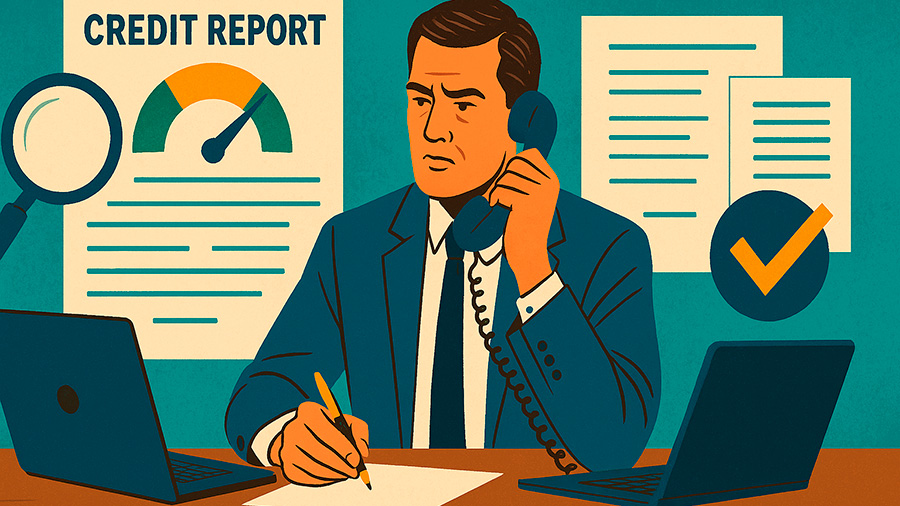
Credit reports can make or break financial opportunities. Whether you’re applying for a mortgage, car loan, or even a job, that three-digit score and the records behind it speak volumes about your reliability. But when errors, outdated data, or unfair entries drag your score down, you might feel powerless to fix it. That’s where credit report cleanup specialists come in. These professionals understand the intricate laws and processes that govern credit reporting and help people navigate one of the most confusing systems in modern finance.
What Credit Report Cleanup Specialists Actually Do
In simple terms, a credit report cleanup specialist helps you identify and correct inaccuracies in your credit file. They act as intermediaries between you, your lenders, and the credit bureaus (Equifax, Experian, and TransUnion). Their primary mission is to make sure that everything listed in your credit report is accurate, verifiable, and current. If it isn’t, they take the necessary steps to dispute and remove it.
According to the Federal Trade Commission, around one in five Americans has an error on at least one of their credit reports. Those mistakes—whether a misreported late payment or a duplicated account—can reduce your score significantly. Specialists exist to fix these kinds of issues, but their expertise extends beyond simple disputes. They know the timelines, documentation requirements, and legal wording that get results faster and more effectively than a DIY approach.
How the Credit Repair Process Works
The work of credit report cleanup specialists follows a structured and legally compliant process. Every step must align with the Fair Credit Reporting Act (FCRA), which gives you the right to challenge inaccurate information. Here’s what typically happens when you hire a specialist.
1. Credit Report Analysis
The first step is a detailed review of your credit reports from all three major bureaus. Specialists look for inconsistencies, outdated entries, and red flags. Common issues include:
- Accounts that don’t belong to you (often caused by identity theft)
- Late payments that were actually paid on time
- Debts reported multiple times by different collection agencies
- Closed accounts still showing as active
- Incorrect balances or credit limits
Each of these can unfairly lower your score, but they’re all fixable once properly documented.
2. Dispute Preparation and Submission
Once errors are identified, specialists prepare formal dispute letters or online claims. The language matters—a poorly worded dispute can be ignored or denied. Professionals know how to cite the specific laws that require bureaus to investigate. They submit disputes to all relevant bureaus and track the timeline of each case.
3. Communication and Follow-Up
Under federal law, bureaus must respond to disputes within 30 days. During that time, specialists monitor the process, contact creditors directly when needed, and ensure that documentation supports your claim. If the investigation confirms the error, the bureau must delete or correct the information immediately.
4. Verification and Ongoing Monitoring
After updates are made, specialists verify that all three reports reflect the corrected data. They also advise clients on maintaining clean credit moving forward—whether that means lowering credit utilization, making on-time payments, or avoiding unnecessary new accounts.
Common Credit Report Issues and How Specialists Handle Them
| Issue | Cause | Specialist’s Approach | Typical Outcome |
|---|---|---|---|
| Incorrect late payments | Clerical or system error | Submit dispute with payment proof | Late mark removed within 30 days |
| Duplicate collections | Debt sold to multiple agencies | Verify ownership and request removal of duplicates | Only valid record remains |
| Fraudulent accounts | Identity theft | File identity theft affidavit and notify all bureaus | Account deleted and flagged as fraud |
| Outdated negative information | Expired reporting period | Request deletion under FCRA seven-year limit | Negative record erased |
This kind of precision is what separates professionals from self-managed disputes. It’s not just about sending letters—it’s about strategy, documentation, and persistence.

Legal Framework Behind Credit Cleanup
The authority of credit report cleanup specialists comes from consumer protection laws. The Fair Credit Reporting Act (FCRA) and the Fair Debt Collection Practices Act (FDCPA) form the backbone of their work. These laws ensure that credit bureaus and lenders must maintain accurate, verifiable information. If they can’t confirm that a record is correct, they must remove it.
Specialists also understand how to navigate “gray areas” where information may not be technically wrong but is misleading—for example, a debt marked as settled rather than paid in full. While they can’t erase legitimate debt, they can negotiate updates that reflect your progress, such as “paid as agreed,” which improves your score’s perception.
How Specialists Interact with Credit Bureaus
Communication with credit bureaus is both an art and a science. Professionals know exactly how to phrase disputes to trigger investigations under the FCRA. They also understand the internal workflow of bureaus—how information flows from creditors to data furnishers to credit agencies.
In many cases, they build relationships with bureau representatives or collection agencies to speed up resolutions. For example, instead of waiting for a bureau to contact a creditor, specialists might reach out directly to the lender, obtain a statement, and present it to all three bureaus simultaneously. This proactive coordination often leads to quicker results.
When Hiring a Specialist Makes Sense
Not everyone needs professional help. If you have one or two small errors, you can dispute them yourself for free. But if your credit report contains multiple negative items, identity theft, or complex legal issues, hiring credit report cleanup specialists can be worth the investment. They save time, reduce stress, and often achieve results that DIY efforts can’t match due to their knowledge of procedural details.
Signs You Should Consider Professional Help
- You have multiple inaccuracies across different credit bureaus.
- Your credit was damaged by identity theft or fraud.
- You’ve tried disputing errors before with no success.
- Debt collectors keep reporting the same debt multiple times.
- You need faster results for an upcoming loan or mortgage application.
Professionals charge either monthly fees or per-deletion rates. Legitimate services operate under the Credit Repair Organizations Act (CROA), which forbids upfront payments before work is performed. If a company asks for full payment before doing anything, that’s a red flag.
How to Identify a Legitimate Credit Report Cleanup Specialist
Unfortunately, the credit repair industry is filled with bad actors who prey on people in financial distress. Knowing how to distinguish reputable specialists from scams is crucial.
| Legitimate Specialist | Scam Warning Signs |
|---|---|
| Provides written contract with clear terms and cancellation rights | Offers “guaranteed” score increases |
| Charges only after services are rendered | Demands large upfront fees |
| Operates under CROA compliance | Suggests creating a new identity or CPN |
| Encourages financial education and budgeting | Discourages you from contacting credit bureaus directly |
Reputable professionals will also take time to explain your rights and responsibilities. They don’t promise miracles—they offer transparency and support, which are far more valuable in the long run.
The Role of Education and Prevention
While specialists can clean up your credit, maintaining a strong score afterward is your responsibility. Many firms now combine dispute services with financial education, helping clients understand how to manage credit responsibly. They might teach you how to lower credit utilization, monitor your score regularly, and build positive payment history.
Simple Habits to Maintain a Clean Credit Report
- Review your credit reports at least twice a year.
- Pay all bills on time—even one late payment can linger for years.
- Keep old accounts open to maintain credit history length.
- Avoid applying for multiple credit cards in a short time.
- Use monitoring tools to catch suspicious activity early.
In the long run, the best “credit cleanup” is consistency. Specialists can remove the past mistakes, but your daily habits determine whether your report stays clean or clutters again.
Turning Cleanup into Confidence
Having errors or outdated information on your credit report can feel like a financial prison, but you’re not stuck there forever. The right guidance from credit report cleanup specialists can open doors to better interest rates, job opportunities, and financial peace of mind. They work within the law, focusing on fairness and accuracy—not shortcuts or scams. Once your report reflects your true financial history, maintaining that integrity becomes a lifelong skill. Cleaning your credit isn’t just about fixing numbers—it’s about regaining control and confidence over your financial future.
